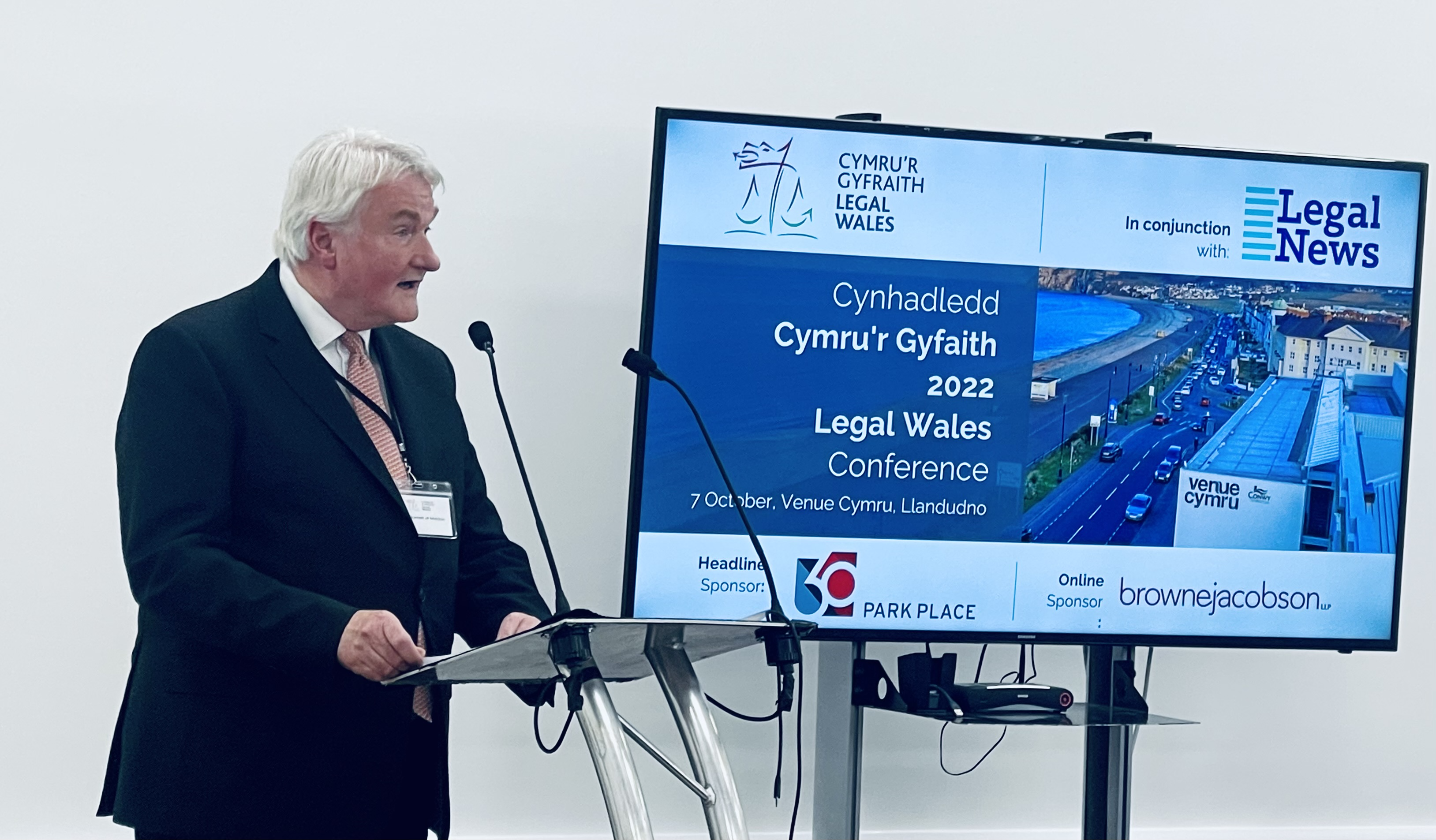In his closing speech at this year’s Legal Wales Conference, the Lord Chief Justice outlined his hopes for the continued modernisation of the judiciary and its reputation, and his belief that the benefits of the rule of law to the economy are, finally, being understood.
In his speech, delivered at the end of the Legal Wales Conference, hosted at Venue Cymru on Friday 7 October 2022, Lord Burnett of Maldon said:
“Legal Wales is one of the firm fixtures in the calendar for legal practitioners, judges and legal academics and it is my great pleasure to join you, embarking on my sixth year as Lord Chief Justice of Wales.
“We seem never to be able to leave COVID-19 entirely behind us but its direct impact on the operation of the courts and legal profession has diminished. As I have said before, Wales led the way in adapting how cases were conducted to enable work in all jurisdictions to continue to function effectively.
“As I speak, there remains uncertainly in the Crown Court across the whole country, for reasons of which we are all aware. Perhaps not for much longer. I certainly hope so. But Wales can be proud of how it coped with the ravages of the pandemic in all jurisdictions and, I should add, by offering aid to regions in England by providing much needed support, helping to reduce caseloads.”
“As COVID-19 fades in its impact, we should now also recommit ourselves to our shared objectives. The continued modernisation and development of the judiciary; a judiciary which continues to attract candidates of high quality to its salaried and fee-paid ranks; imaginative work to reduce backlogs in all jurisdictions and improve access to justice including the use of new technology.
“While all these objectives are important for delivering justice for Court and Tribunal users, I have spoken about them often, as have other judges and lawyers, and although we will continue to do so, today I would like to spend a few minutes focusing on an area that I think is often overlooked. That is the benefit of UK law to the economy and the vital importance of our international reach and status as a judiciary, not only in Europe but across the Commonwealth and more widely around the globe.
“Two years ago I said at this conference that I was sorry ‘not to be able to welcome hundreds of judges and magistrates from across the world in Cardiff for the 50th anniversary of the Commonwealth Magistrates’ and Judges’ Association’, due to be held in September 2020. It was a casualty of Covid. I promised to do my best to bring the annual conference of the CMJA to Wales before too long. It gives me great pleasure to confirm that the next conference will be held in Cardiff in September 2023.
I will be delighted to host the conference and showcase the very best that Wales and its judges, magistrates, tribunal members, and lawyers have to offer to the Commonwealth. I know it will be a wonderful event, but I hope it will be a little less eventful than the last meeting.
“Exactly a month ago today, from my hotel room in Ghana, I had my first call over an imperfect telephone line with the new Lord Chancellor, a fresh Cabinet having just been formed by the Prime Minister in the hours after her appointment. 24 hours later we were all reeling from the news of the late Queen’s declining health and then of her death. It was poignant to be at a conference with almost 400 from across the Commonwealth, representing over 40 nations. It was moving to receive, and share, sympathies from across the globe as we united in our sorrow. The kindness shown to all judges from the United Kingdom was remarkable and gave an insight into the deep affection and respect in which the Queen was held as Head of the Commonwealth.
“The conference itself was a timely reminder of the importance of international engagement of the judiciary. We have an extensive programme of engagement with the judiciaries of countless countries around the world, discussing issues of mutual interest, sharing best practice and providing assistance with training. Annually, we welcome literally hundreds of judges to England and Wales from dozens of jurisdictions, both Common Law and Civilian, who come for training and to get experience of how our criminal and civil courts operate.
“Judicial activity overseas, contact with other judiciaries whilst at home, and the welcome extended to judges who are visitors to the UK has long been undervalued as one of the notable features of our global position, just as our courts have been undervalued in their importance to the British economy.”
“We promote the rule of law, encourage international respect for our institutions and the rule of law here. We promote this jurisdiction as a venue for international dispute resolution and English law internationally; and through both we promote our domestic legal and ancillary services. This is part of soft power.
“Soft power is difficult to define and rank, yet attempts are made. The ‘Soft Power 30’ report[1], last issued in 2019, placed the United Kingdom second only to France, and ahead of, in turn, Germany, Sweden, the US and Switzerland. A more recent attempt at ranking[2], published this year, also places the UK as second, but to the US and leading Germany, China and then Japan.
“We are conscious of the constraints around our international activity. Some are prosaic. We have no spare judicial capacity and so time of judges is scarce. Most importantly, we must consider the reputation of the judiciary of England and Wales when dealing with countries where an understanding of the rule of law differs profoundly from ours. An event like the Commonwealth Magistrates’ and Judges’ Association meeting on home turf provides an excellent opportunity to cement good relations.
“In recent years we have taken a far more strategic approach to our international engagement, conscious that contact can have a far wider impact than training a dozen senior judges in a far-flung capital city. With the leap to ubiquity in video conferencing technology during the pandemic the sharing of ideas, innovation and best practice has become easier. I now have regular meetings with Chief Justices from around the world, individually and together, to share our approach to collective problems.
“The rule of law underpins all economic and social activity in this country and, independently, the law of this jurisdiction and the Common Law bring substantial economic benefits. Both are, I think, largely taken for granted and their contributions undervalued.”
I touched on this topic when I spoke at this conference last year and spoke more extensively in the Blackstone Lecture in Oxford earlier this year. There is a growing momentum of discussion surrounding this issue. For example, earlier this week Lord Hodge, the Deputy President of the Supreme Court, gave an insightful talk at the Guildhall in London entitled ‘The Rule of Law, the Courts and the British Economy’. The new Lord Chancellor, The Rt Hon. Brandon Lewis MP, referred to this issue at his swearing in over which I presided last week, again at the opening of the legal year on Monday and once more at his party’s conference. We now have the full attention of Government.
“The figures involved are very large. In 2019 the total revenue to the United Kingdom from legal activities was around £36.8 billion and it is growing. In 2021, legal activities employed about 365,000 people across the United Kingdom, with two-thirds of that employment outside London[3].
“The sector thus plays an important direct role in providing employment not just for those who work in the legal sector but also for support services. UK law underpins many trillions of pounds worth of global trade. These are direct economic benefits but only a small part of those benefits.”
“Nobody would suggest that the economic benefits of education are to be valued by adding up the direct contribution schools, universities etc. make to GDP and employment. A well-educated population is vital to prosperity and to growth. The same can be said of the health sector. A healthy population is vital to prosperity and to growth.
“The rule of law, an independent judiciary, both personally and institutionally, and a vibrant independent legal profession are vital to prosperity and to growth. These last three things are bedrocks upon which the prosperity and growth of this nation rests.
“There can be no doubt that our judiciary and our legal services are globally recognised as a shining national asset.”
“Among the strengths that our system offers, both domestically and to attract international investment, is predictable law adjudicated upon by an independent judiciary, underpinned by an outstanding legal profession.
“Our Common Law is able to adapt and develop to respond to developments in business in particular, and to do so quickly, including to technological developments in the way business is transacted.[4] The 2021 Oxera report on the ‘Economic Value of English Law’ demonstrated that the fiscal benefits of our law come not only from legal services themselves, but from the legal system’s fundamental underpinning, and indeed encouragement, of business transactions outside the legal services[5]. This provides confidence domestically and internationally. The law is one of the building blocks on which all else rests.
“Globally, all three jurisdictions in the UK are recognised as having a strong commitment to the rule of law and to openness, ranking 12th out of 126 countries for both[6]. It is disappointing that the UK is only 12th but the differences in the upper reaches of the rankings are relatively small.
“One important aspect is that our judges are recognised as being of high calibre, completely incorruptible and fiercely independent. Our courts remain efficient, despite the challenges they face, and are universally regarded as reliable and fair.”
“A visible feature of the strength of our legal system is that international litigants often choose the UK as the place to settle their disputes. This year alone, for example, 40% of litigants in the London Commercial Courts were international. An enormous amount of international dispute resolution is conducted in the UK, with London being a popular seat of arbitration. While we have much to be proud of and to promote across our international networks, it is important that we do not rest on our laurels and take this unique but fragile position for granted. And while we welcome this international attention, it is important that we continue to develop the strength of our commercial courts outside London.
“The civil courts in Wales are able to offer effective and timely dispute resolution at all levels of dispute, but I am conscious that the physical facilities available, particularly at the Cardiff Civil Justice Centre, are far from what they should be. We will continue to press for improvements even in the increasingly strained environment of public finances.”
“As I say, we can never rest on our laurels. We must constantly look at our practice and procedure to make sure that they are appropriate for the cases they govern. We are constantly striving, in all jurisdictions, to improve timeliness, reduce the number of hearings before a case is finally resolved and to encourage early resolution.
“Critically, we need to maintain the high reputation and standing of our judiciary. A feature of much of the Common Law world, is that the judiciary is drawn from the ranks of successful practising lawyers.
“I continue to be concerned that a number of recruitment exercises run by the Judicial Appointments Commission have fallen short in providing the required number of judges. The good news is that while there was a problem in recruitment to the High Court for a number of years that is no longer the case. The High Court is an important international showcase. It is welcome that the problems caused directly by the technical changes to judicial pensions, now reversed by legislation that came into force in April, were recognised by Government.
“Our difficulties now arise in two particular areas. First, although recruitment to the circuit bench for the family and civil jurisdictions remains relatively buoyant, the recent recruitment round fell short in securing the number of judges we need to sit in the Crown Court. That is particularly disappointing because judicial resources in the Crown Court are one of the constraints of dealing with the increased outstanding caseload.”
“Recruitment of District Judges for the county and family courts has fallen short for the last few years. The problem is not universal and is most pronounced in London and the South East. The judiciary is working hard to encourage applications; and so too are the Judicial Appointments Commission and the professions. But we are also looking hard at the jurisdiction of district judges and the nature of the work they do with a view to easing the burden through the use, for example, of standard directions, paper rather than oral hearings for very small claims, delegation of routine making of directions to legal advisers, the creation of virtual lists dealing with cases from overburdened parts of the country in courts with fewer problems and indeed much else.
“The last initiative has worked well already in the Employment Tribunal. A welcome decision of the Court of Appeal in K v K will have the effect of curtailing the proliferation of wide-ranging fact finds in family cases which appeared to be gaining a life of their own without the exercise being necessary for the decision of the court which was in fact being made. More family cases will be heard in the Magistrates’ Court as capacity there increases.
“I have commissioned detailed work in all jurisdictions to focus on what we, as judges, can do to improve the throughput of cases, deal with them with fewer hearings, avoid imposing disproportionate burdens on litigants and encourage all key players in each jurisdiction to work together to improve timeliness and thus reduce outstanding caseloads. That work has already born fruit and will continue to do so in the months ahead.”
“This is part of what is necessary to sustain the efficient and effective administration of justice at every level and also to maintain the reputation more widely of our courts and tribunals.
Our international reputation and our international engagement are founded on a recognition that, despite the manifest problems we face, our courts and tribunals still operate effectively in support of the rule of law.
We will have an opportunity next year, as we welcome hundreds of judges from across the Commonwealth to Cardiff, to cement existing relationships, build new ones and show that legal services, legal scholarship and the judiciary in Wales form a critical part of the legal underpinning of the rule of law in the UK. The organising committee are working on the programme, on the topics for discussion and the opportunities for social gathering. It will be fascinating and fun. I would encourage the judiciary of Wales to take an active part.
_______
[1] Soft Power 30 (https://softpower30.com/)[Soft Power 30] 2019
[2] Global Soft Power Index 2022
3 Legal excellence, Internationally renowned UK legal services 2020 [TheCityUK], 2020
[4] ‘English law: the platform for international business’ (English law: the platform for international business – Portland (portland-communications.com)) [Portland Communications] 2022
[5] ‘Economic value of English law (The-value-of-English-law-to-the-UK-economy.pdf (legaluk.org)) [Oxera] 2021
[6] Rule of Law Index (WJP-ROLI-2019-Single Page View-Reduced_0.pdf (worldjusticeproject.org)) [World Justice Project] 2019










